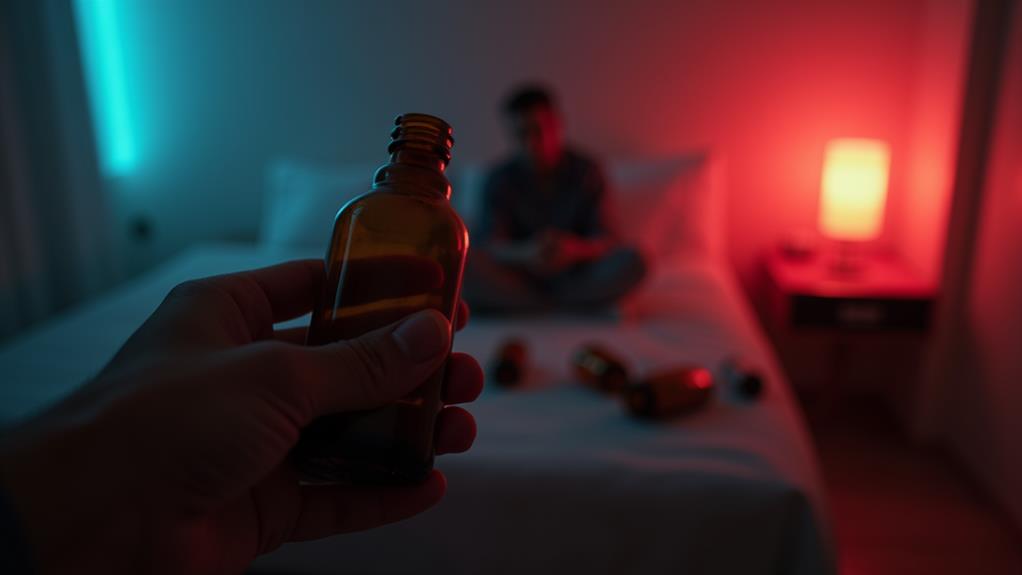Hooked on Poppers: The Shocking Truth About Psychological Dependence
Psychological dependence on poppers, notwithstanding their initial allure, can lead to severe consequences. Users may experience intense cravings, prioritize use over responsibilities, and develop increased tolerance. Long-term effects include potential brain damage, anxiety, and depression. Health risks range from temporary vision loss to cardiovascular issues and cognitive impairment. Breaking the cycle requires a multifaceted approach, addressing underlying factors and developing healthier coping mechanisms. Recovery options include support groups, therapy, and rehabilitation programs. Understanding the full spectrum of risks associated with popper use is essential for those concerned about their own or others' consumption patterns.
The Allure of Poppers

Though poppers have been used recreationally for decades, their allure stems from several key factors that contribute to their ongoing popularity.
The primary attraction lies in their ability to induce a brief, intense euphoria accompanied by muscle relaxation and sensory improvement. Users report heightened sexual experiences and increased pleasure during intimate encounters.
Poppers also facilitate social bonding within certain communities, creating a shared experience that nurtures a sense of belonging.
Yet, it's important to note that chronic use can lead to significant respiratory issues. The rapid onset and short duration of effects make them appealing for those seeking quick, controllable highs.
Moreover, their relatively low cost and legal status in many regions contribute to their accessibility. The perceived safety compared to other substances, in spite of potential health risks, further adds to their appeal.
These factors combined create a potent draw for individuals seeking both physical and social gratification.
Signs of Psychological Dependence

Recognizing psychological dependence on poppers requires attention to specific behavioral and emotional patterns. Users may experience intense cravings and an overwhelming desire to use poppers, even in inappropriate situations. They might prioritize obtaining and using poppers over other activities, neglecting responsibilities and relationships. Increased tolerance and the need for larger doses to achieve the same effects are common signs.
Chronic use has been linked to irreversible brain damage, particularly in the cerebral cortex and cerebellum, highlighting the severity of potential dependence. Furthermore, those with psychological dependence often suffer from anxiety and depression, worsening their overall mental health.
Individuals may exhibit anxiety or irritability when unable to access poppers, indicating potential withdrawal symptoms. Unsuccessful attempts to quit or reduce usage, in spite of awareness of negative consequences, further suggest dependence.
Users often develop ritualistic behaviors around popper use and may employ them as coping strategies for stress or emotional discomfort. Denial of the problem and defensiveness when confronted about usage are likewise typical indicators. Recognizing these signs is essential for those seeking support and understanding within the community of popper users.
Health Risks and Consequences

Health Risks and Consequences
Beyond psychological dependence, poppers pose significant health risks and consequences for users. The inhalation of these volatile nitrites can lead to severe health effects, including temporary vision loss, dizziness, and cardiovascular issues.
Regular use may result in damage to the immune system and increased susceptibility to infections. Users have reported visual disturbances, such as neon snowflakes, and methemoglobinemia linked with severe respiratory distress.
While poppers have a lower addiction potential compared to other substances, their psychological grip can be strong. Users may develop a habit of relying on poppers for sexual encounters or social situations, leading to difficulties in functioning without them.
This dependence can strain relationships and impact overall well-being. Long-term use of poppers has been associated with cognitive impairment and memory problems.
Furthermore, the risk of dangerous interactions with other substances, particularly erectile dysfunction medications, emphasizes the importance of understanding the full spectrum of health consequences associated with popper use.
Breaking the Cycle

Breaking free from psychological dependence on poppers requires a multifaceted approach tailored to the individual's specific needs and circumstances. Addressing the underlying factors contributing to habit formation is vital. This may involve identifying triggers, developing healthier coping mechanisms, and exploring alternative stress-relief strategies.
Users often report health effects ranging from eyesight issues to muscle twitching, underscoring the significance of finding safer alternatives.
Cognitive-behavioral therapy can be particularly effective in challenging and restructuring thought patterns associated with popper use. Support groups provide a sense of community and shared experiences, nurturing a sense of belonging among individuals aiming for recovery.
Mindfulness techniques and stress management skills can help individuals navigate cravings and emotional challenges without relying on poppers.
It's important to recognize that breaking the cycle of dependence is a process that requires patience, commitment, and often professional guidance. By addressing both the physical and psychological aspects of dependence, individuals can work towards sustainable recovery and improved overall well-being.
Recovery and Support Options

Given the complex nature of psychological dependence on poppers, a range of recovery and support options are available to individuals seeking help.
Support groups, such as 12-step programs or substance-specific peer groups, offer a sense of community and shared experiences. These groups provide a safe space for individuals to discuss their challenges and progress with others who understand their struggles.
Therapy options, including cognitive-behavioral therapy (CBT) and motivational interviewing, can help address underlying psychological factors contributing to popper dependence. These evidence-based approaches allow individuals to develop coping strategies, identify triggers, and modify harmful thought patterns.
Furthermore, holistic approaches like mindfulness meditation and stress management techniques may complement traditional treatment methods. For those who have experienced eye discomfort from popper use, supplementing recovery with antioxidant-rich supplements and vital vitamins may aid in overall well-being.
Some individuals may benefit from inpatient or outpatient rehabilitation programs, which offer structured environments and extensive care.
In the end, the most effective recovery plan is tailored to each person's unique needs and circumstances.
Call Us To Assist You
The psychological dependence on poppers, like Odysseus tethered to the mast, poses significant risks to users' health and wellbeing. Although not physically addictive, habitual use can lead to a Pavlovian response, compelling continued consumption in spite of negative consequences. Breaking this cycle requires professional intervention, support networks, and alternative coping strategies. As with Sisyphus pushing his boulder, recovery is an ongoing process. Increased awareness and access to evidence-based treatments are essential for addressing this often overlooked form of substance abuse.


